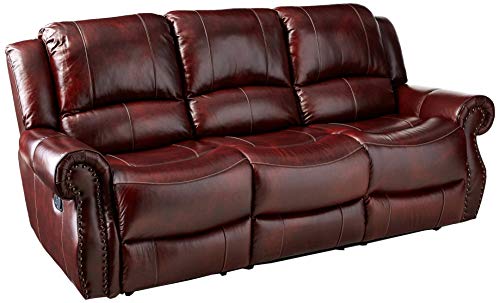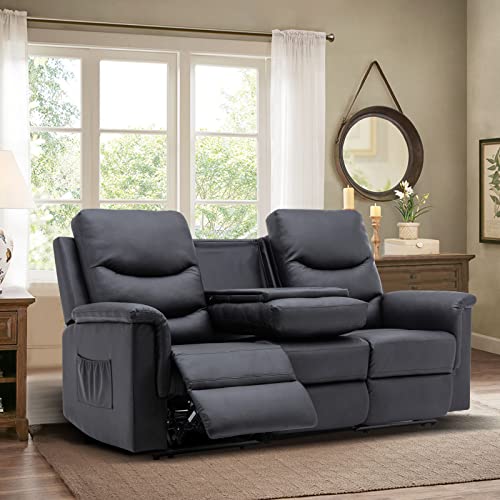10 Things You Learned From Kindergarden That Will Help You With Genuin…
페이지 정보

본문
 How to Spot a Genuine Leather Sofa
How to Spot a Genuine Leather SofaWith a buttery-soft leather upholstery this sofa looks fantastic in any room. People love its simple design and top-quality genuine leather upholstery.
Untrained eyes may have difficulty discerning the difference between genuine and faux leather. Here are six helpful ways to tell the difference: 1. The rough edges.
1. Labels are crucial
Real leather is hard to duplicate. It has a distinctive appearance and feel. It's also durable and easy to clean. It does not absorb body oils, which makes it a great choice for families with allergies. However, not all leather sofas are created equal. Some stores have even been known for passing off PVC as genuine leather sofas for sale.
To avoid being scammed, it's crucial to know the various types of leather. This includes determining the full grain and top-grain leather, as well as assessing the quality of the upholstery. The most knowledgeable retailers will be more than pleased to provide this information and more, so don't hesitate to inquire!
To determine if you have a genuine leather sofa first glance at the label. It should clearly state what type of leather the sofa is covered in, as well as any other materials like cotton or fabric. In addition, reputable suppliers will have clear policies regarding returning or exchanging items in the event you're dissatisfied with your purchase.
If the sofa does not come with a label, you can still verify its authenticity by examining the upholstery's fabric backing or by opening the cushion casing. You can also check the texture of the leather to determine whether it's got any flaws or bumps because these are indicators that you're dealing in fake or bonded leather.
Another method to determine the integrity of a sofa is by the surface of the sofa with your fingertips. Genuine leather will have a soft and smooth texture, while bonded or faux leather will be coarser and more akin to suede. You should also be in a position to feel the difference between wrinkles, bumps and printed patterns of faux leather and genuine leather.
While a genuine leather sofa will cost more than a imitation counterpart It's a wise investment as it will last longer and will often become family heirlooms over the years. You can limit the damage caused by sun, ozone, heat and humidity by putting your leather sofa in a cool, dark room away from fireplaces, heaters and air conditioners. You can also use leather protection creams to keep your sofa in good shape and strong.
2. Take a look at the back
If the label doesn't inform you what kind of leather sofa is, you need to get up close and intimate with it. The scent, the feel and backing will all be a clear indication of authenticity.
When you get a feel of genuine leather, it won't feel smooth and silky. This is because animal hides have different pores which allow them to breathe. However, a product that feels smooth suggests that it may be fake leather.
Be aware of bumps and uneven surfaces. Genuine leather is made by rubbing away a portion of the rough outer layer. But if the material used to cover your sofa is top-grain leather it will still have some bumps.
You can also test the leather by pressing your finger into it and then running it across it. If it's genuine the leather will stretch and wrinkle a little as human skin does. This means that it's able to breathe, ensuring that the material doesn't become dry and crack over time.
Faux leather is uniform in pattern due to the fact that it is printed, however genuine leather will have imperfections that contribute to the beauty and durability of the leather. This can be seen in scratches, creases and scars. Genuine leather is soft and a little stiff when it's brand new. But, it should not dry out or crack if you condition it regularly by applying a leather protection cream.
To cut costs, some furniture manufacturers make use of a mix of synthetic and real leather to make their products. The areas that are 'contact, such as seats, armrests, and backs, are made from real leather, whereas the non-contact areas like the outside and base arms, are upholstered using a less expensive synthetic fabric made of polyurethane or leather. Even if the sofa is labeled as genuine leather, you should look closely at the backing to determine if the couch is genuine leather.
Labels and prices can point you in the right direction, but to truly ensure that a sofa is genuine leather, you need to get up close and personal with it. Smell it, touch it and look at its back for a backing of polyurethane which is an obvious indicator that it is not genuine leather.
3. Check out the seat
The seat of a genuine leather sofa is a further indicator of its quality. While many faux leather couch leather couch couches use different fabrics for the upholstery authentic leather has a distinctive texture that feels smooth to the touch, but isn't entirely uniform in color and shade. Be aware of bumps under the surface and a strong natural, fresh scent. These are the characteristics that distinguish genuine leather from fakes or low-grade leather.
If the leather is stitched in a continuous, large piece, it's a obvious sign. Although this isn't uncommon with faux leather, if you observe this on genuine top-grain leather, it's most likely to indicate that the sofa isn't of high-quality and should be avoided.
The price and label may provide an idea however the only reliable way to know is to touch the furniture. Genuine leather shouldn't be flawless and have a rough feel. It also has rough edges and fat wrinkles under the surface. The suppleness of genuine leather also feels different from synthetic material, and the temperature of the furniture will reveal whether it's constructed with authentic materials.
Leather sofas are a mainstay of interior design for good reason. They're stylish durable, long-lasting, and durable. It is also easy to clean and resistant to spills of liquid. This makes it a great option for families with children or pets. Genuine leather is a timeless fashion that will never be out of style. It's also available in different price ranges.
Consider the Pottery Barn's Turner leather sofa that will last for a lifetime. The two-seater might be on the pricey side but it's constructed using top-quality leather that will last for a lifetime. It's a great choice for those who have limited space, since it comes in with three sizes and fits in almost any room.
If you're looking for something little more modern, consider this All Modern Geo Genuine Leather Sofa. The mid-century-modern-inspired sofa has an angular, sleek design with cylindrical pillows and an elegant frame. While the frame is crafted from composite, plywood and plastic, this sofa is made of genuine leather in the seating area, which is a welcome step up from Ikea's faux-vegan leather couch couch, which was awarded CHOICE's "Shonky" award in the year 2015.
4. Look at the smell
Real leather has a distinctive scent. It's an organic, natural scent that cannot be duplicated. If the sofa you are trying to buy has a strong synthetic smell it's a sign that it's not authentic. It is usually due to the chemicals that were used to treat leather. These chemicals can linger on furniture long after it's been made.
One way to check the quality of leather sofas is to run your fingers across the surface. Real leather will feel rough and show bumps and lumps like human skin. If it feels smooth and cold, it's most likely fake or the leather is bonded.
You can also open one of the cushions to inspect the back. False and bonded leather may have a polyurethane backing that supports the upholstery that is manufactured, whereas true leather has an untreated back that is similar in appearance to coarse suede. If you see a woven fabric backing, this is a dead giveaway that the couch isn't real leather.
Peter advises that if you are trying to determine if the sofa is authentic, the best way is to put it against your body and run your fingers across the surface. The roughness of the leather will make your fingernails duller, and the surface should stretch and wrinkle a little. It will also feel warm to the contact.
Another way to tell whether a sofa is authentic is to turn it over on its side and look at the back of the sofa. Genuine leather is a solid piece of leather, not a plastic-coated faux or bond leather.
Consider how much you will use your leather sofa and how long it will last when choosing the quality. The more you use your sofa, the more it will require to be cared for. Peter suggests regular and gentle cleaning with a special conditioner for leather to maintain the suppleness and softness of the leather and keep it from becoming hard and dry.

- 이전글Some Of The Most Common Mistakes People Make With Tufted Leather Sofa 24.09.14
- 다음글5 Laws That Will Help The Vibrating Anal Plug Industry 24.09.14
댓글목록
등록된 댓글이 없습니다.